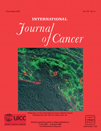Genetic polymorphisms in alcohol metabolism, alcohol intake and the risk of stomach cancer in Warsaw, Poland
Abstract
Genetic variations increasing blood levels of acetaldehyde, the first metabolite of alcohol, refrain their carriers from drinking alcohol but may also put them at increased risk of cancer because of the mutagenic and carcinogenic effect of acetaldehyde. In a population-based study of 305 cases and 428 controls in Warsaw, Poland, we evaluated the effect of polymorphisms in alcohol metabolizing genes, including ADH1B (Ex9+5C>T, Ex3+23A>G, Ex3+58A>T and Ex9+77A>G), ADH1C (Ex8-56A>G and Ex6-14G>A) and ALDH2 (Ex1+82A>G), on levels of alcohol drinking and susceptibility of stomach cancer. We found that among control subjects frequency of alcohol drinking varied by alcohol metabolizing genotype. In particular, the weekly consumption of individuals carrying the AA, GA and GG genotypes of ALDH2 Ex1+82A >G polymorphism were 3.75, 2.26 and 1.53 drinks, respectively (p= 0.04). However, none of the assessed polymorphisms in these 3 genes had a measurable effect on stomach cancer risk. When stratified by ALDH2 Ex1+82A>G polymorphism, alcohol-related increases in stomach cancer risk were restricted to individuals with the AG/GG genotypes, with a more than 2-fold risk among daily drinkers (OR = 2.63, 95% CI = 1.00–6.88) and 3-fold risk (OR = 3.66, 95% CI = 1.19–11.24) among those with 40 or more drink-years. In summary, our results suggested that the ALDH2 Ex1+82 G allele may be functionally deficient in eliminating acetaldehyde and discourage alcohol drinking. Furthermore, heavy drinkers of alcohol who were genetically prone to accumulate acetaldehyde may face an increased risk of stomach cancer. © 2007 Wiley-Liss, Inc.




